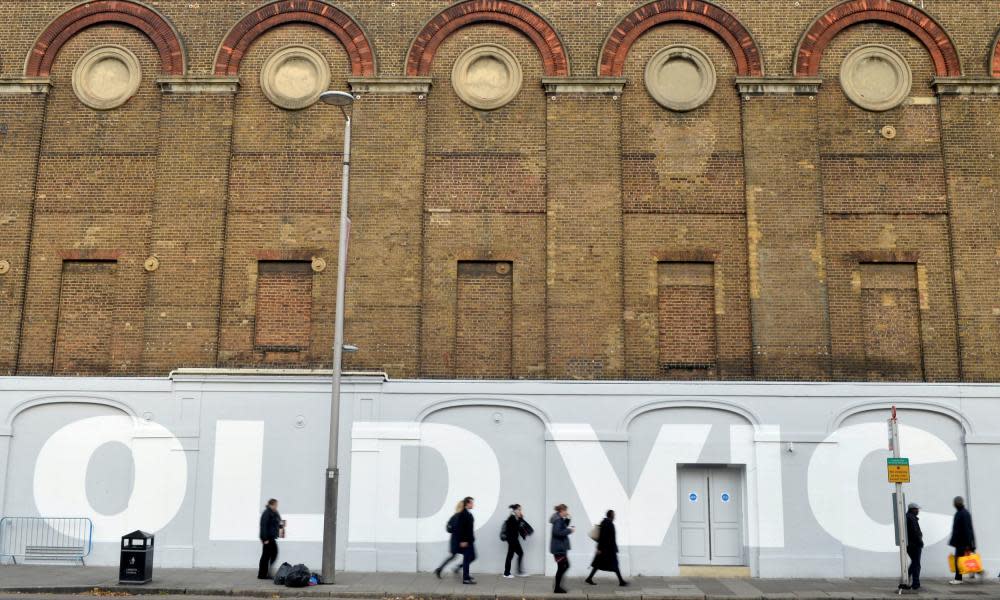Old Vic among UK beneficiaries of trust embroiled in drug crisis

The Old Vic, the National Theatre and several other UK cultural and educational institutions received donations totalling more than £7m last year from the Sackler family, whose influential philanthropic role has come under the spotlight after allegations that the transatlantic dynasty’s fortune has been tainted by the US opioid crisis.
The largest beneficiary was Imperial College London, which received £2.5m from the Sackler Trust, followed by Royal Museums Greenwich, given £1.5m.
Theresa Sackler, a director of the trust and one of the UK’s most prolific arts philanthropists, is being sued by the US state of Massachusetts along with other family members and Purdue Pharma. Much of the family’s wealth has come from one product: OxyContin, the prescription painkiller launched in 1996 that has been a major aggravator in the opiod crisis thatis killing more than 100 people a day in the US.
While US activists have been stepping up pressure on galleries and museums funded by the Sacklers, the issue has also cast a shadow over their activities in the UK. The Guardian revealed this year that the National Portrait Gallery was reviewing a £1m pledge from the Sacklers, made in 2016, in line with its ethical fundraising policy.
But accounts filed this month by the Sackler Trust show 12 entities received grants last year of more than £150,000, along with 53 miscellaneous donations of less than that figure. Beneficiaries included the Royal Court’s resident company, the English Stage Company (£700,000), Alexandra Park and Palace Charitable Trust (£500,000), the Old Vic (£300,000), the National Theatre (£250,000) and the Roundhouse arts and concert venue (£225,000).
Among the most active critics of the Sacklers and Purdue Pharma has been the artist Nan Goldin, who recently recovered from a near-fatal addiction to OxyContin and has staged direct actions inside US arts institutions funded by the family.
“One of our goals is to try to force the hand of the museums and other institutions to refuse future funding,” she told the Guardian.
“There’s a museum in London that’s still debating whether to take a large Sackler donation and has asked me to have an exhibition with them. If I accept it, I would turn it into an intervention.” Goldin later confirmed that the institution was the National Portrait Gallery
Ryan Hampton, a US campaigner who is in recovery from a decade-long opioid addiction, told the Guardian that the only acceptable philanthropy for the Sacklers to pursue was in “supporting resources and finances that will end the opioid crisis that poured billions into Purdue Pharma”.
“The Sacklers are the direct beneficiaries of the vast and profound suffering created by purposefully misleading doctors about their company’s products,” he added. “Co-opting our cultural institutions is reputation-laundering and it’s a distraction.”
While it is unclear if negative publicity had been a factor, the Sackler Trust’s grants last year – initially totalling £8,433,749, but a £1m donation for the collapsed Garden Bridge project was returned – equate to less than half of the £21m given in 2016.
The Massachusetts case is being watched closely by some UK institutions, the Guardian understands. The Sackler family members being sued in the case include Theresa and Beverly, the widows of the brothers Mortimer and Raymond Sackler, who grew Purdue Pharma into a pharmaceutical empire. Forbes magazine estimates that a core group of 20 family members in the Mortimer and Raymond Sackler branches of the family are collectively worth $13bn (£10bn).
A spokesperson for Imperial College said it received charitable donations from a range of sources that helped strengthen its research and education through scholarships, academic positions, research centres and capital projects.
It added: “All donations are considered carefully under our relationship review and gift acceptance policies, and we keep all relationships with third parties under continuous review.”
A spokesperson for the Sackler Trust said: “In 2017, the Sackler Trust supported groundbreaking medical research into osteoporosis and brain disorders, helped young people from a broad range of backgrounds access the arts and the nation’s cultural heritage, provided educational opportunities for men and women in prison, supported a project to help young people who are in recovery from addiction and homelessness and are providing funds for a substance abuse programme for ex-servicemen and women.
“The Sackler Trust is just one of the Sackler family charitable foundations and, since 2010, it has contributed over £60m to important and diverse causes. It is a privilege to be able to support such vital work and we continue to do so.”
Purdue Pharma also issued a statement after the Guardian contacted the family’s PR company in the UK. It said the company had led industry efforts to combat prescription drug abuse, which has included collaborating with law enforcement, funding enhancements and improvements to state prescription drug-monitoring programmes.
“In addition, we’ve recently announced educational initiatives aimed at teenagers warning of the dangers of opioids and we continue to fund grants to law enforcement to help with accessing naloxone,” it said.
“We recognise that more needs to be done and that’s why we launched a long-term initiative which will build over the coming months and years as we pursue a range of solutions that we believe will have a meaningful impact to help address the opioid addiction crisis.”

 Yahoo News
Yahoo News 
